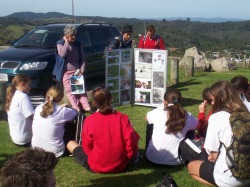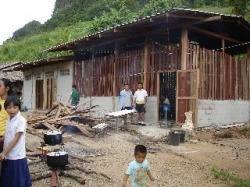Social Inquiry Leading to Social Action

This image is of a group of students from Edgecumbe College receiving information about a Whakatane area project that saves damaged birds and returns them to their natural environment. Not all learning takes place in the classroom; the students shown are only a handful of the large group that visited local organisations to find out what they do to help the environment. This part of the learning experience took place at an important local site where students also found out about the kiwi protection scheme operating in the area. From this location, students were able to view many of the conservation sites in the area .
All too often we hear about young people who are involved in anti-social behaviour such as defacing property, crime, violence, and drug-taking. The vast majority of youth are not involved in these activities; they are more interested in knowing what the social issues are and in being part of the solution, but they need adults to provide support for them to achieve this.
My Year 10 Te Ao Whanui students provide a wonderful example of students who are engaged in social inquiry leading to social action. Although in its first year of development the course has surpassed my expectations in terms of how engaged students are in their learning and how committed they are to achieving excellence. In addition to being involved in a local social action of their own choosing, students in this class also participate in Taking IT Global (a social action online forum for youth), are developing e-pal links with Burmese children living in a refugee camp just inside the Thai border, are currently preparing for the Junior Model United Nations Debate to be held later this year, have assisted with a Learning Retreat involving 50 gifted and talented students from 7 local primary schools, and are raising funds to allow them to visit, and participate in, a foreign culture. Students have been involved in tree-planting at a local bush reserve and have participated in phone and video-conferences with Jace Hobbs, a champion for the Burmese refugee children. Despite also requesting the opportunity to sit advanced-placement assessments for NCEA, these wonderful young people have no hesitation in volunteering to provide support for others wherever and whenever they are needed. They are fine examples of youth involved in positive behaviour at both local and global levels and it is a privilege to be just one of the adults in their lives providing them with the support they need to achieve their goals.
Anne Sturgess
All too often we hear about young people who are involved in anti-social behaviour such as defacing property, crime, violence, and drug-taking. The vast majority of youth are not involved in these activities; they are more interested in knowing what the social issues are and in being part of the solution, but they need adults to provide support for them to achieve this.
My Year 10 Te Ao Whanui students provide a wonderful example of students who are engaged in social inquiry leading to social action. Although in its first year of development the course has surpassed my expectations in terms of how engaged students are in their learning and how committed they are to achieving excellence. In addition to being involved in a local social action of their own choosing, students in this class also participate in Taking IT Global (a social action online forum for youth), are developing e-pal links with Burmese children living in a refugee camp just inside the Thai border, are currently preparing for the Junior Model United Nations Debate to be held later this year, have assisted with a Learning Retreat involving 50 gifted and talented students from 7 local primary schools, and are raising funds to allow them to visit, and participate in, a foreign culture. Students have been involved in tree-planting at a local bush reserve and have participated in phone and video-conferences with Jace Hobbs, a champion for the Burmese refugee children. Despite also requesting the opportunity to sit advanced-placement assessments for NCEA, these wonderful young people have no hesitation in volunteering to provide support for others wherever and whenever they are needed. They are fine examples of youth involved in positive behaviour at both local and global levels and it is a privilege to be just one of the adults in their lives providing them with the support they need to achieve their goals.
Anne Sturgess
Pang Kham links with Edgecumbe College

Edgecumbe College students are developing online e-pal relationships with Burmese children living in the Pang Kham camp for Burmese refugees. The camp is located just within the Thai border. These orphaned children are innocent victims of the Burmese Military Junta in the country currently known as Myanmer. Edgecumbe College students are helping the Burmese children learn English while they, in turn, learn about the values, beliefs and conditions that sustain the Burmese children.
